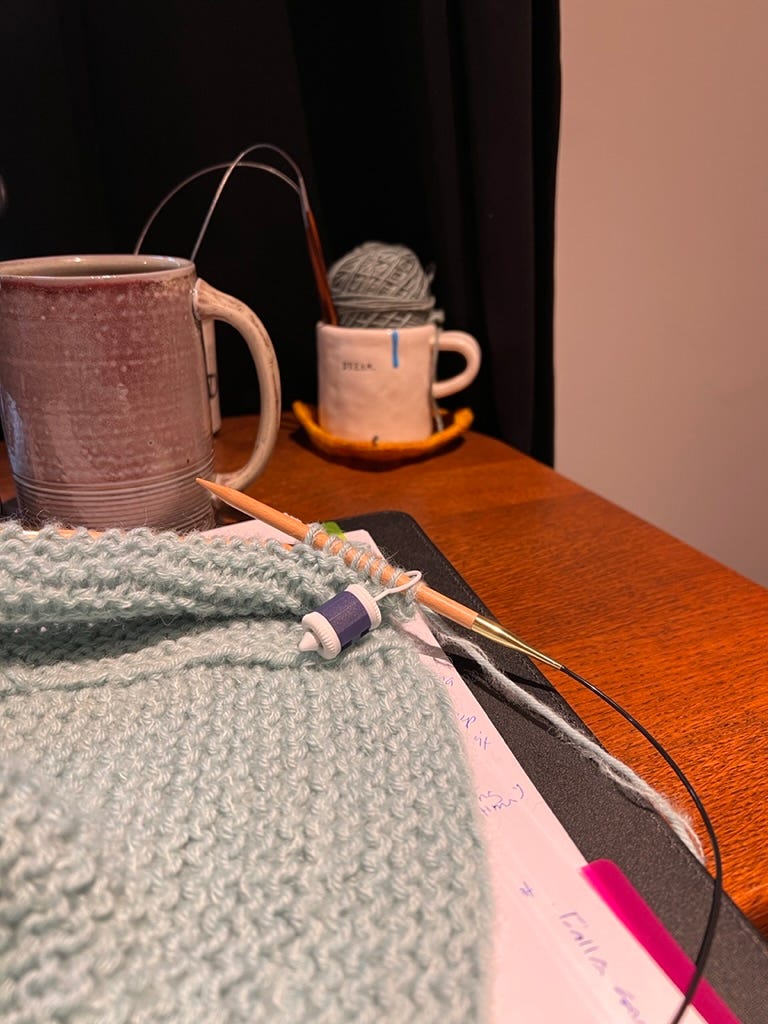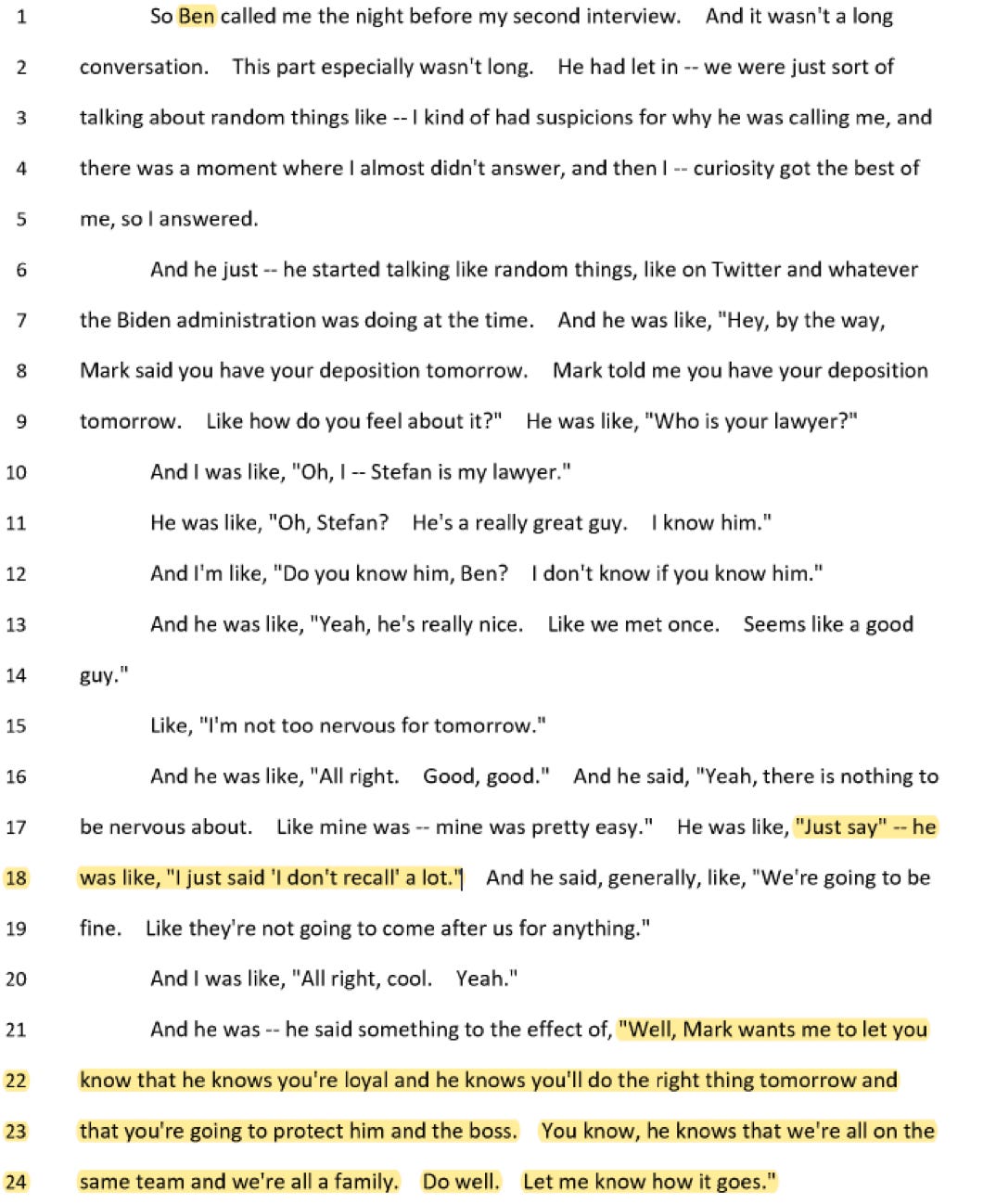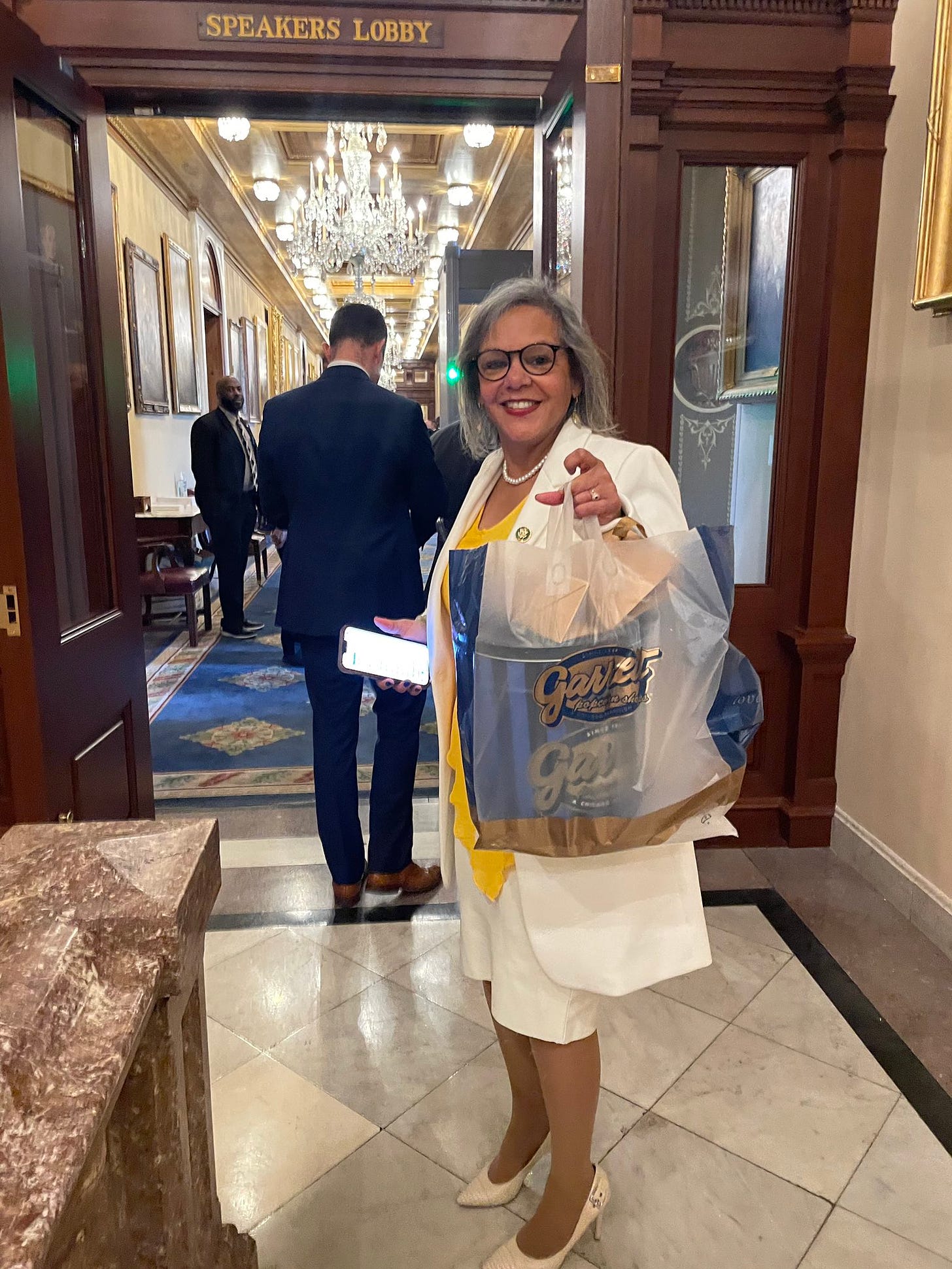It’s the new year. You’ve had time to celebrate and unwind. And you may have decided it’s time to take a peek on your own into the January 6 committee’s report and the slew of transcripts and other materials the committee has now released. If you’ve done that, you, like me, are probably feeling incredibly overwhelmed by the sheer volume of material that’s now available.

Unless it’s your full-time job to digest the evidence (shout-out to special counsel Jack Smith and his team), it’s highly unlikely you’ll be able to read everything and then figure out what it all means taken together. That doesn’t mean you shouldn’t read the pieces of it that interest you the most or focus in on key issues, because you absolutely should. But I think it’s important to engage in a practical recognition that the committee’s materials are a significant, substantial compilation of a historical record that will be used by citizens and scholars alike going forward. The report and committee materials document what happened so people in the future, both near and distant, will be able to understand what happened and how we make sure it doesn’t repeat.
Viewed through that frame, the report makes more sense (and is less intimidating). It is a historical record we will live with. It will undoubtedly be added to (the historical record, not the report itself), as our politics move forward and the Justice Department and other prosecutors make decisions about who and whether to prosecute. We have lived through this history, instead of studying it in school as those down the road will, and many of us still feel the fragility of the republic in our bones. Ultimately, we learn from the report that people who believe they can reject the truth with “alternative facts” do not serve us and are dangerous. That phrase was an early hallmark of the Trump administration, where the term was coined to justify Trump’s pretense about his inaugural-crowd size. It’s a dangerous mantra for anyone, but especially for a world leader, a narrow-minded, unintelligent, self-centered man who cared more about crowd size than service to country and who went on to become the first president to be twice impeached before leading an insurrection, and was able to do it precisely because the truth was no barrier to his misconduct.
That seems to me to be the right framework for reviewing the report. It lets us absorb the details over time that help us understand how Donald Trump, fabulist, progressed to become Donald Trump, insurrectionist, and how we keep it from happening again. A few key points in that regard, to start off what will undoubtedly be an inquiry we’ll come back to again and again in 2023.
Accountability matters.
We can’t say this enough. There are at least two possible types of accountability the country can deliver to Trump, political and criminal. He’s already faced some political accountability, losing in 2020, but committee chairman Bennie Thompson advanced the case for the criminal justice system to deliver it as well. In his forward to the report, he wrote: “Beyond what we recommend, in my view and as I said during our hearings, the best way to prevent another January 6th is to ensure accountability for January 6th. Accountability at all levels. I have confidence in our Department of Justice and institutions at the state and local level to ensure accountability under the law. As this report is released, we see those processes moving forward.”
The committee’s bottom line is that Trump is responsible for January 6, in the sense that it could not have taken place in his absence. This likely informed their decision to avoid going too deep into intelligence collection failures or law enforcement responsibility, which could have detracted from their one central point, that “[the] evidence has led to an overriding and straight-forward conclusion: the central cause of January 6th was one man, former President Donald Trump, who many others followed,” as the committee wrote in its summary. “None of the events of January 6th would have happened without him.”
In the Mueller report, the special counsel’s office concluded they could not, because of DOJ’s internal policies, prosecute a sitting president. Instead they packaged up their evidence for Congress, with an invitation to impeach. Now the shoe is on the other foot, with the committee shipping its evidence to a new special counsel with a recommendation that he prosecute. Hopefully, we’ll finally see Trump held accountable in court in 2023.
There was a big drop of witness transcripts ahead of the January 6 committee report release and continuing afterwards.
One of the big pieces of news was the number of people who asserted their Fifth Amendment rights repeatedly and to even the most innocuous of questions—where did you go to school, what’s your age (Charlie Kirk)? In the summary of the report, the committee had already told us that “Trump lawyers and supporters Jenna Ellis, John Eastman, Phil Waldron and Michael Flynn all invoked their Fifth Amendment privilege against self-incrimination when asked by the select committee what supposed proof they uncovered that the election was stolen.” They were not alone, and were joined by upwards of 20 witnesses.
Think about what that means: a witness asserts the Fifth Amendment when a truthful answer would tend to incriminate them. The big lie was a lie, and they all knew it. The committee concluded, “Not a single witness—nor any combination of witnesses—provided the select committee with evidence demonstrating that fraud occurred on a scale even remotely close to changing the outcome in any state.”
Maintaining their belief in the big lie is essential to all of these people if DOJ decides they’re candidates for prosecution. It is, of course, not true. Fraud did not steal victory from Trump in 2020. The big lie was discredited by judges across the country, Trump’s own election team, voting rights experts, local election officials, and common sense. But if prosecutors were to, say, contemplate bringing charges of interference with an official proceeding, they would have to show that any defendants acted with an improper purpose. That sort of charge, along with others that require a specific intent to bring about an illegal outcome, make it essential to show that defendants, like the lawyers, or Trump himself, knew that he’d lost the election and proceeded with their efforts nonetheless. So the idea that truthful answers would have incriminated these witnesses is important. It’s like waving a big red flag at federal prosecutors that says, “Investigate some more here.”
Lots of witnesses took the Fifth. But there were some who testified that Trump and others knew he’d lost the election. That included the third of Trump’s four chiefs of staff, Mick Mulvaney, who resigned from his role as U.S. Special Envoy to Northern Ireland following January 6. After the election, he worked on results and testified Trump acknowledged to him that he had lost Arizona. Cassidy Hutchinson’s transcript (she was interviewed formally after the public hearing where she testified) reveals that Mark Meadows told her on November 18, 2020, that Trump “has pretty much acknowledged that he’s lost… A lot of times he’ll tell me that he lost, but he wants to keep fighting it, and he thinks that there might be enough to overturn the election.” General Mark A. Milley, the chairman of the Joint Chiefs of Staff, testified to a meeting in the Oval Office following the election in which Trump said “words to the effect of: Yeah, we lost, we need to let that issue go to the next guy. Meaning President Biden.”
That testimony may also be critical for Fulton County District Attorney Fani Willis. Willis, if she indicts Trump, will have to convince a Georgia jury that when Trump asked Georgia Secretary of State Brad Raffensperger for the 11,780 votes he needed to “find” to win that election, he knew he’d lost and was trying to interfere with the legitimate outcome of the vote. The committee’s transcripts suggest Willis may have strong evidence in that regard. The committee’s work furthered the evidence to confirm what common sense tells us, that Trump knew he lost and that all of his efforts to stay in power were illegitimate.
There is a credible suggestion of an effort to tamper with a witness, Cassidy Hutchinson.
We learned more, from the newly released Hutchinson transcripts, about how she came to testify before the committee. Hutchinson was originally represented by a lawyer who had previously worked inside the Trump White House, Stefan Passantino. Passantino promised her she’d never receive a bill from him. That seemed sketchy to her, and she asked him who would be paying. She testified that he told her, “If you want to know at the end, we’ll let you know, but we’re not telling people where funding is coming from right now.” He added, “Don’t worry, we’re taking care of you.” Although having a third party pay for legal services is permissible under ethics rules, the client has to be given sufficient information for informed consent, and the lawyer’s obligation must be to the client, not the source of payment. That seems questionable here. And in case you’re wondering who was paying, Passantino’s LLC received hundreds of thousands of dollars in payments from the pro-Trump Save America PAC. The Save American PAC also provided the multimillion-dollar payment to a Florida lawyer hired to represent Trump in the Mar-a-Lago case.
Among the direction Hutchinson says Passantino provided her with was the admonition that “the less you remember, the better.” She testified that his response, when she related what she’d been told about Trump trying to go to the Capitol on the 6th, was “No, no, no, no, no. We don’t want to go there. We don’t want to talk about that.” Hutchinson’s takeaway was that Passantino was advising her that there was no need; that because the committee didn’t already know about it, there was no “need to share it with them.” She ultimately became concerned that this advice had led her to lie during her testimony. She hired a new lawyer, and the rest we know, from hearing her testify publicly.
Passantino, whose name has disappeared from the website of the law firm he was working for at the time the transcripts were released, denied doing anything wrong in a public statement.
But there’s more. Hutchinson also says that the night before she testified the second time, her former boss, Mark Meadows’, spokesperson reached out to her. She related the details of her call with Ben Williamson.
The loyalty pledge is mob-worthy. While it’s a lot easier to suspect that witness tampering was attempted or occurred than it is for prosecutors to prove it in court, this testimony is enough to raise the hackles of any career prosecutor. And it’s bone-chilling. Perhaps Hutchinson is the only witness subjected to this sort of treatment. But it’s now incumbent upon prosecutors to dig deeper and see if her testimony holds up in the first instance and, if so, whether there are additional cases of it. Witness tampering is a crime, a very serious one, because it compromises prosecutors’ ability to get to the truth and hold guilty people responsible for their conduct. The special counsel has his work cut out for him.
DOJ should have full access to the committee’s work. Before the new Congress, when a Republican-led House would take office, the committee made a last-minute dash to get as many transcripts and communications into the public domain as possible. I was collecting these thoughts, not knowing if House Republicans would manage to elect a speaker today, when Oklahoma Representative Tom Cole, a Kevin McCarthy ally, made the motion to adjourn the House and further proceedings until noon Wednesday.
I don’t think it’s an overstatement to suggest that the Republican Party’s disarray is due in large part to the committee’s work. The GOP strategy of ignoring the insurrectionists among them seemed likely to succeed until the committee shined a light on Trump’s role and captured his party’s complicity as well. Tomorrow you might want to have some popcorn ready at noon to show solidarity with Democrats, who poked a bit of fun at Republicans today by carrying theirs with them.
We’re in this together,
Joyce






Seeing is believing. I will wait to see what happens with all of the information that the January 6 committee has gathered, and I am glad to have your analysis Professor Vance. I was also experiencing Schadenfreude today at the problems McCarthy is having to get himself seated. It was on German news tonight on ZDF, the station I usually watch. This is the beginning of the Republicans revealing to the rest of the world how they get nothing done. In fact, the Democrats should start encouraging Moderate Republicans that they might be better off if they switch parties, if they actually want to govern. I was tempted to email McCarthy and suggest that he put up the new guy, George Santos for Speaker of the House, since the credentials required are to be a slimy liar, and he is batting 1000 in that respect. However, ultimately I will save my energies for something I actually would like to have happen. Yay on making the Abortion pills available in pharmacies without having to go to a doctor's office to get them. https://www.cnn.com/2023/01/03/politics/fda-abortion-drugs-pharmacies-mail/index.html
https://www.theguardian.com/world/2022/jun/10/mexico-abortion-access-americans
Joyce,
An excellent summary as always! And I’m glad you mentioned popcorn as I must but a large bag before tomorrow afternoon’s House session. (Gotta wait until morning due to the tornado watch in our area. Turn on Spann and be safe.)
tom j...bluff Park